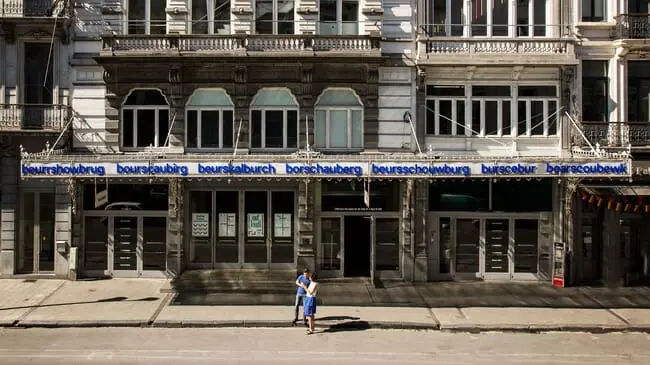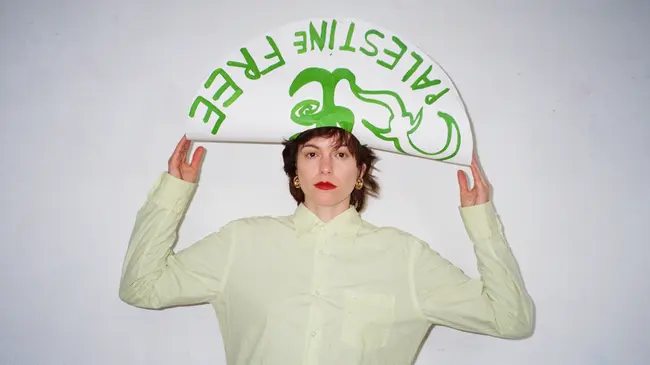Tuning into the business side of music-making

Under her stage name Tristan, Isolde Van den Bulcke makes music she defines as sitting in a ‘grey zone’. By valorizing self-reliance and learning as much as possible from the get-go, the musician and producer hasn’t let hardship nor pursuing a niche genre hold her back. We focus the conversation on the business side of things, an urgent topic around which Isolde has valuable insights to share. To give the conversation a bit more context we presented Isolde’s story to Antonio Cornelis; our business consultant in the artistic and creative sector. He lists to us the possibilities of getting your business things done right. Learn with us!
It’s easy to imagine the challenges of making it into the music industry, especially at a young age. What has your trajectory been like?
Isolde: I studied jazz vocals for eight years at three different conservatories. I released two EPs before my debut album Wellif came out in 2022. I'm now working on more instrumental music but also on another record with vocals, pushing to produce everything on my own. And then we’ll see, for now, I'm busy enough! But at the same time, it's funny to be having this interview now because I haven't played much since September. It’s just me in my studio writing, so it doesn’t feel like I'm actively part of the industry.
<img class="editorial-image-50-left" src="https://cdn.prod.website-files.com/61eebcc683107b99137f4423/6654980d577ff430ea14e71a_Tristan%20(c)%20Alice%20DooremanAD_DC_Tristan-2.webp"/>
<img class="editorial-image-50-right" src="https://cdn.prod.website-files.com/61eebcc683107b99137f4423/665498095d58d56e95c9113c_Tristan%20(c)%20Alice%20DooremanAD_DC_Tristan-3.webp"/>
How does a musician earn an income?
Isolde: If you don't play live, you essentially don't earn any money. Gigs are also where you can sell merchandise, so those two things lead to some profit. If you’re in the more commercial circuit, then you also earn money from royalties. I remember some time ago a song from my EP gained traction on the radio; so three times that year I got this ‘surprise money’, which I never expected.
At which point did you start working with management?
Isolde: When I started as Tristan, the first year or two, I did everything myself to get a sense of what goes behind releasing an album. There's this idea that one has to first have a team before releasing anything, which to me is quite scary: you assign so much responsibility to others and if you're not so well informed on how things should operate, or aware of how hard things can be, there’s a risk of being unhappy with the work produced. Now I have both a booker and a manager and I rely on a non-profit organisation, which enables me to apply for funding and organise the finances of my activities.
Antonio: The startup of a non-profit organisation needs the collaboration of several people together. You can’t organise this on your own. It involves quite a bit of administration. Please read the information about the process in detail on the website of vi.be.
<img class="editorial-image" src="https://cdn.prod.website-files.com/61eebcc683107b99137f4423/66549809db2978ad1b60f27a_Tristan%20(c)%20Alice%20DooremanAD_DC_Tristan-4.webp"/>
What are their roles?
Isolde: A manager is the one you have the most contact with and is the person who protects the artist and their interests and is there to filter out what the artist shouldn’t be exposed to. I feel super safe in his hands. He used to be in a band, so he knows firsthand what it means to be a musician. I'm also not a financially super lucrative project, so I know he’s been with me for four years because he believes in it [laughs]. My booker was the first person who saw me perform live and approached me straight away. I’ve heard it’s pretty hard to get one nowadays, so that makes me all the more grateful to be working with mine.
What about working with collaborators and compensating them?
Isolde: Initially, I was very focused on developing a certain sound, so I paid a producer to help with that. We made a mutually beneficial agreement in advance. Communication is the most important thing because, in the beginning, it's all fun and games: everybody is willing to make sacrifices. Especially working with friends, as things move forward, the reality of financial instability hits and if you don't have a structure in place things can go badly. I was so relieved when the project funding for the creation of my new record came through because it meant I could pay everyone involved and it opened up more possibilities. My fellow band members can send an invoice and get paid by the non-profit organisation for their contribution and I, as a non-freelancer, get paid for my work through Amplo, a social bureau for artists. I'm currently saving up to apply for my kunstwerkersattest (art worker certificate), so I should hopefully have that in place by next summer.
<img class="editorial-image-50-left" src="https://cdn.prod.website-files.com/61eebcc683107b99137f4423/6654980ad57e1fcbf8c56dd1_Tristan%20(c)%20Alice%20DooremanAD_DC_Tristan-6.webp"/>
<img class="editorial-image-50-right" src="https://cdn.prod.website-files.com/61eebcc683107b99137f4423/6654980a69f3fca72b1f459c_Tristan%20(c)%20Alice%20DooremanAD_DC_Tristan-5.webp"/>
Antonio: First of all, I would suggest checking out the differences in your net salary for the different social bureaus. Some are more expensive than others because each of them takes a percentage for the administration they perform. Amplo is well-known but there are other, sometimes cheaper options: Interimpro by Paypro Services, Tentoo,... You can find a full list here: https://www.vlaanderen.be/erkenning-van-uitzendbureaus/erkende-uitzendbureaus
The second question you could ask yourself: ‘Is working through a social bureau for artists the right formula for me’? Other options could include working with a 1bis contract or a project contract.
Lastly, you could opt for direct employment through your non-profit organisation. Once your income reaches a certain level, this could be more beneficial. I can’t speak for others but if you were to work via RoAn Art Consulting, my company, the gross salary would be around 8000 euros per year. In this case, you need to take the administrative costs for example payroll statements, Dimona registrations, etc… into account and again, compare that for different social secretariats.
<img class="editorial-image" src="https://cdn.prod.website-files.com/61eebcc683107b99137f4423/6654980871a1ed8623761314_Tristan%20(c)%20Alice%20DooremanAD_DC_Tristan-10.webp"/>
Will qualifying as an art worker result in more time and space for your practice to grow?
Isolde: Well, I'm lucky and happy to have a teaching position at the Royal Conservatory in Antwerp, where I give singing classes. This, and a possible future art worker allowance will give me some space to breathe. I like to have something on the side though, because if you're only ever involved with the introspection required in developing your artistic work, that can also become quite heavy. The teaching helps me gain some distance, and I get inspired by assisting and following other people’s journeys.
<img class="editorial-image" src="https://cdn.prod.website-files.com/61eebcc683107b99137f4423/6654980833090bf58bc412c4_Tristan%20(c)%20Alice%20DooremanAD_DC_Tristan-7.webp"/>
Antonio: From 2024 on, artists in Belgium can apply for an art worker certificate and art worker allowance. In short, there are two ways to get this.
The first option would be the starter certificate as a bachelor's or master's in the arts graduate. To get this you need to submit a business plan for the next five years, a financial plan for the next three years and prove five artistic assignments for a minimum of 500 euro gross. With a valid starter certificate, you can apply for an allowance which grants you a basic income for the first three years. The amount depends on your situation, for example; do you live alone, do you have children, etc…
The second option is the art worker certificate plus. In this case, you don’t need to prove any art school diplomas. Instead, for the application you need to have worked as an artist and prove a 5418 euro gross salary. Income from copyrights or freelance artistic work counts too. Besides this, there’s a commission that checks if you are a professional artist depending on your portfolio. With a valid art worker certificate plus, you can apply for a monthly allowance. You receive this only if you can prove 156 days of work (calculated in task wage or taakloon) as an employer in the last 24 months. That doesn’t necessarily need to be artistic work but the work as a permanent official (vastbenoemde ambtenaren), for example in education, doesn’t count! When working with Amplo this would equal 22.140 euro gross income, when working directly through your non-profit this would only be 16.700 euro gross. (Note: This was calculated on the example contracts we had.)
<img class="editorial-image-50-left" src="https://cdn.prod.website-files.com/61eebcc683107b99137f4423/6654980b808c86e0bbbbb5aa_Tristan%20(c)%20Alice%20DooremanAD_DC_Tristan-9.webp"/>
<img class="editorial-image-50-right" src="https://cdn.prod.website-files.com/61eebcc683107b99137f4423/6654980cf71fb90659a097a6_Tristan%20(c)%20Alice%20DooremanAD_DC_Tristan-8.webp"/>
You can only apply for an art worker allowance as an unemployed person who is entitled to get the unemployment allowance. For example: If Isolde were to quit her job at the Royal Academy herself, she wouldn’t be eligible for the allowance in the first place.
Once you have the certificate and receive the allowance you can apply for an extension of your allowance after three years and prove 78 days of work in the past three years, which equals a salary of 5982,06 eur gross as an employee.
<img class="editorial-image" src="https://cdn.prod.website-files.com/61eebcc683107b99137f4423/6654980954c783efa3823f55_Tristan%20(c)%20Alice%20DooremanAD_DC_Tristan-12.webp"/>
How did you gain the understanding and the tools to set up Tristan?
There are resources out there, but you have to know about them. Institutions like Cultuurloket are super nice, they helped me a lot, especially in the beginning. When my debut album came out, I was such a wreck because it was so hard to get attention and super hard to get gigs. And then when we got them, the ticket sales went super slow. That used to be hard to accept and move on from; but now that I know how things work, I don’t let it get to me as much anymore.
<div class="editorial-banner"> Antonio Cornelis: personal business advice in the artistic/creative sector<br/> <br/> @tristan.nnnnn</div></div>
Different Class works with the interest of their community at heart.
Our work’s purpose is to foster a solid network for independent artists, those who love them, and those who want to support them. Become a member to contribute to the local Belgian art scene.






